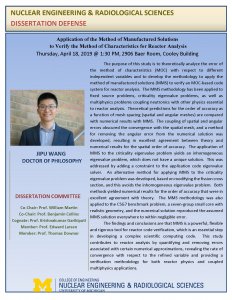Presented By: Nuclear Engineering & Radiological Sciences
PhD Defense: Jipu Wang
Application of the Method of Manufactured Solutions to Verify the Method of Characteristics for Reactor Analysis

Title: Application of the Method of Manufactured Solutions to Verify the Method of Characteristics for Reactor Analysis
Chair(s): Prof. Bill Martin, Prof. Benjamin Collins
Abstract: The purpose of this study is to theoretically analyze the error of the method of characteristics (MOC) with respect to different independent variables and to develop the methodology to apply the method of manufactured solutions (MMS) to verify an MOC-based code system for reactor analysis. The MMS methodology has been applied to fixed source problems, criticality eigenvalue problems, as well as multiphysics problems coupling neutronics with other physics essential to reactor analysis. Theoretical predictions for the order of accuracy as a function of mesh spacing (spatial and angular meshes) are compared with numerical results with MMS. The coupling of spatial and angular errors obscured the convergence with the spatial mesh, and a method for removing the angular error from the numerical solution was developed, resulting in excellent agreement between theory and numerical results for the spatial order of accuracy. The application of MMS to the criticality eigenvalue problem yields an inhomogeneous eigenvalue problem, which does not have a unique solution. This was addressed by adding a constraint to the application code eigenvalue solver. An alternative method for applying MMS to the criticality eigenvalue problem was developed, based on modifying the fission cross section, and this avoids the inhomogeneous eigenvalue problem. Both methods yielded numerical results for the order of accuracy that were in excellent agreement with theory. The MMS methodology was also applied to the C5G7 benchmark problem, a seven-group small core with realistic geometry, and the numerical solution reproduced the assumed MMS solution everywhere to within negligible error.
The findings and conclusions are that MMS is a powerful, flexible and rigorous tool for reactor code verification, which is an essential step in developing a complex scientific computing code. This study contributes to reactor analysis by quantifying and removing errors associated with certain numerical approximations, revealing the rate of convergence with respect to the refined variable and providing a verification methodology for both reactor physics and coupled multiphysics applications.
Chair(s): Prof. Bill Martin, Prof. Benjamin Collins
Abstract: The purpose of this study is to theoretically analyze the error of the method of characteristics (MOC) with respect to different independent variables and to develop the methodology to apply the method of manufactured solutions (MMS) to verify an MOC-based code system for reactor analysis. The MMS methodology has been applied to fixed source problems, criticality eigenvalue problems, as well as multiphysics problems coupling neutronics with other physics essential to reactor analysis. Theoretical predictions for the order of accuracy as a function of mesh spacing (spatial and angular meshes) are compared with numerical results with MMS. The coupling of spatial and angular errors obscured the convergence with the spatial mesh, and a method for removing the angular error from the numerical solution was developed, resulting in excellent agreement between theory and numerical results for the spatial order of accuracy. The application of MMS to the criticality eigenvalue problem yields an inhomogeneous eigenvalue problem, which does not have a unique solution. This was addressed by adding a constraint to the application code eigenvalue solver. An alternative method for applying MMS to the criticality eigenvalue problem was developed, based on modifying the fission cross section, and this avoids the inhomogeneous eigenvalue problem. Both methods yielded numerical results for the order of accuracy that were in excellent agreement with theory. The MMS methodology was also applied to the C5G7 benchmark problem, a seven-group small core with realistic geometry, and the numerical solution reproduced the assumed MMS solution everywhere to within negligible error.
The findings and conclusions are that MMS is a powerful, flexible and rigorous tool for reactor code verification, which is an essential step in developing a complex scientific computing code. This study contributes to reactor analysis by quantifying and removing errors associated with certain numerical approximations, revealing the rate of convergence with respect to the refined variable and providing a verification methodology for both reactor physics and coupled multiphysics applications.